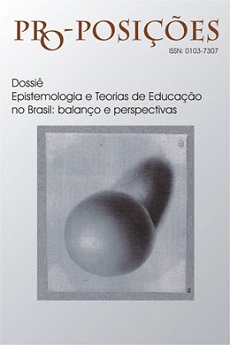Abstract
Nas pesquisas em Educação, a cada dia existe uma maior preocupação, entre outras, em discutir o lugar do “social” nas diversas concepções sobre a ciência, inclusive a ciência educacional; na organização, realização e avaliação de pesquisas; na produção e na difusão dos conhecimentos escolares; etc. Nesse contexto, uma das posições que têm aparecido é a denominada “Epistemologia Social”. O presente trabalho aborda uma das possíveis origens desse termo e alguns de seus usos posteriores nos estudos sobre a Ciência e a Educação. Assim, debruça-se particularmente sobre como essas diversas posturas relacionadas com a “Epistemologia Social” se posicionam perante a importância teórica e prática da Epistemologia; o caráter social do conhecimento; o progresso científicotecnológico; e a formação dos cientistas e dos professores.
Abstract:
Among other issues recently discussed in educational research is the role of the ‘social’ character in the theoretical and methodological conceptions about science – including educational science – in research planning, execution and assessment, as well as in the production and dissemination of academic knowledge. In this context, one of the proposals that have been forwarded is the so-called “Social Epistemology”. This paper presents information on one of the possible origins of this term and how it has been used in research on science and education. So, the paper focuses on the different perspectives in which this trend has been approached regarding the theoretical and practical relevance of Epistemology. It also focuses on the social character of knowledge, on the new developments of science and technology and on the educational issues of scientist and teacher education.
Key words: Social epistemology. Educational research. Knowledge. Progress
References
ABRANTES, P. C. C. Naturalizando a Epistemologia. In: ABRANTES, P. C. C. Epistemologia e cognição. Brasília: Editora Universidade de Brasília, 1994, p. 172-218.
BLOOR, D. The Strong Programme in the Sociology of Knowledge. In: BLOOR, D. Knowledge and Social Imagery. London: Routledge & Kegan Paul, 1994, p.1-19.
EGAN, M. The library and social structure. Clive Bingley, 1978. p. 2.738. (Originally published: Library Quarterly 25(1), Jan. 1955.) EGAN, M. The library and social structure.: Library Quarterly, 1978.
FLECK, L. La genésis y el desarrollo de un hecho científico: introducción a la teoría del estilo de pensamiento. Madrid: Alianza, 1986.
FULLER, S. Social Epistemology. Bloomington and Indianapolis: Indiana University Press, 1991.
FULLER, S. Science. Minneapolis: University of Minnesota Press, 1997.
GOLDMAN, A. Argumentation and Social Epistemology. Journal of Philosophy 91, 1994, p. 27-49.
GOLDMAN, A. Epistemologia Naturalista e Confiabilismo. Cadernos de História e Filosofia da Ciência, Campinas, Série 3, v.8, n.2, jul.-dez.1998, p.109-145.
GOLDMAN, A. Knowledge in a Social World. New York: Oxford University Press. 1999.
HARDING, S. After the Neutrality Ideal: Science, Politics, and Strong Objectivity. Social Research 59(3), 1992, p.567-587.
KITCHER, P. Contrasting Conceptions of Social Epistemology. Socializing Epistemology, ed. Frederick Schmitt. Lanham, MD: 1994: 111-34.
KUHN, T.S. A Estrutura das Revoluções Científicas. São Paulo: Perspectivas, 1975.
MUCHIE, M. The Practice of a Theorist. European Association for the Study of Science and Technology (EASST REVIEW). v.16(4), December 1997. (Review of Steve Fuller, Philosophy, Rhetoric & The End of Knowledge: The Coming of Science and Technology Studies, Wisconsin University Press, 1993.) MUELLER, S. Bibliotecas e sociedade: evolução da interpretação de função e papéis da biblioteca. Revista da Escola de Biblioteconomia da Universidade Federal de Minas Gerais (UFMG), Belo Horizonte, 13(1): 7-54, mar. 1984.
POPKEWITZ, Th. Reforma Educacional: uma política sociológica – poder e conhecimento em educação. Porto Alegre: Artes Médicas, 1997.
RORTY, R. Philosophy and the mirror of nature. NJ: Princenton University Press, 1979.
SCHMITT, F. Socializing Epistemology. Lanham, Dd: Rowman and Littlefield, 1994.
SHERA, J. H. Toward a Theory of Librarianship and Information Science. Ciência da Informação, Rio de Janeiro, 2(2), 1973, p. 87-97.
SHERA, J. H. Epistemologia Social, Semântica Geral e Biblioteconomia. Ciência da Informação, Rio de Janeiro, 6(1): 1977, p.9-12. (Tradução do Maria Esther de Araújo Coutinho do artigo “Social Epistemology, General Semantics, and Librarianship.” Wilson Library Bulletin 35 (10) June 1961).
VEIGA-NETTO, A. Epistemologia Social e disciplinas. ANPEd: Caxambu/MG: 1995.
A Proposições utiliza a licença do Creative Commons (CC), preservando assim, a integridade dos artigos em ambiente de acesso aberto.

